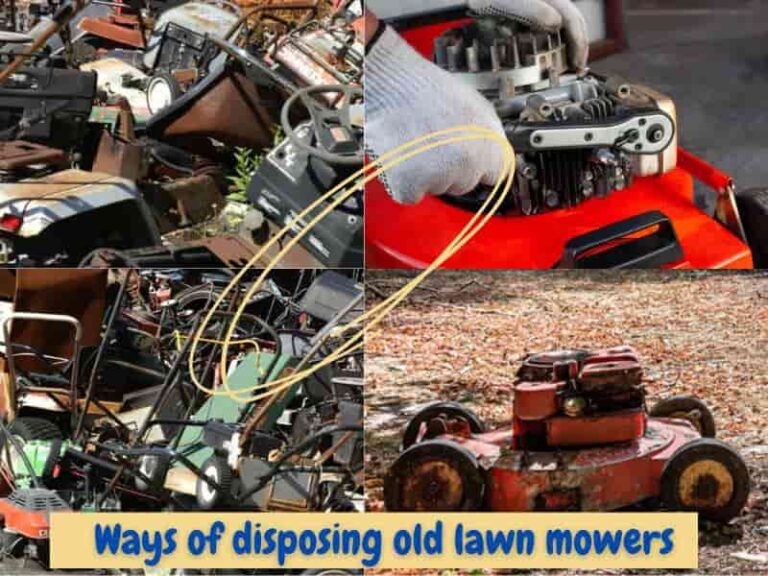Will Antifreeze Kill Grass? (How to Neutralize)
Antifreeze is one of the best products for car enthusiasts to prevent overheating, especially in extreme weather. Sometimes antifreeze accidentally spills may happen from engines and containers onto the lawn. But can antifreeze spills kill grass?
Antifreeze spills adversely affect grass, depending on type and concentration. Alcohol-based will stunt growth and kill the grass, while Ethylene glycol-based is severe and will kill grass and any vegetation it touches. To neutralize the spill, use sand, ash, clay or sawdust to salvage grass.
What happens if antifreeze gets on the grass?
There are two forms of antifreeze, and both are toxic to grass. However, ethylene glycol-based antifreeze will kill grass and any vegetation it touches. The deterioration starts days after the ethylene glycol antifreeze gets on the grass. In large doses, it will seep into the soil, contaminate water sources, and decimate root systems. The Propylene glycol-based antifreeze is a less-lethal and milder on grass only in its diluted form.
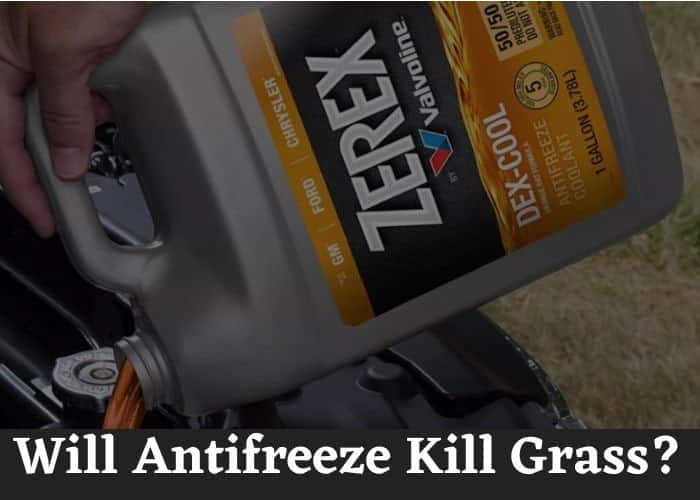
What is the impact of antifreeze on the grass? While it’s toxic to grass, ethylene glycol is not persistent in the soil since it eventually breaks down.
However, it will cause the following adverse effects on the grass in high concentrations:
- The lawn will be patchy and discolored in the spill area.
- Antifreeze inhibits turfgrass growth. In most cases, there will be an 80% reduced grass growth. Reduced growth is caused by the low absorption of water by the roots. Ethylene glycol-based antifreeze stresses the roots, delaying or completely stopping their development.
- The height of the grass reduces by around 30% per week, and antifreeze will eventually kill the grass.
- Because Antifreeze affects all plants, it will inhibit the growth of weeds, shrubs, and trees on the lawn.
- Ethylene and propylene glycol antifreeze cause adverse effects on beneficial microbes in the soil.
- Antifreeze spills and disposal on the lawn can create runoff of toxic chemicals to water streams and groundwater.
- Ethylene glycol and propylene glycol chemicals on the lawn are toxic to pets and humans and cause immune-response diseases.
Note: Turf injury from antifreeze differs according to the concentration and extent of the spill.
Read Also: Does Bleach Kill Grass?
Will Diluted Antifreeze kill grass?
Pure antifreeze does not contain water. If you add water to the antifreeze, it creates a coolant. Diluted antifreeze will still kill grass if it contains ethylene glycol. Ethylene glycol, even when diluted, is still toxic. It is not biodegradable and will cause problems for the grass.
Ethylene glycol is toxic and will slowly kill the grass by reducing its growth.
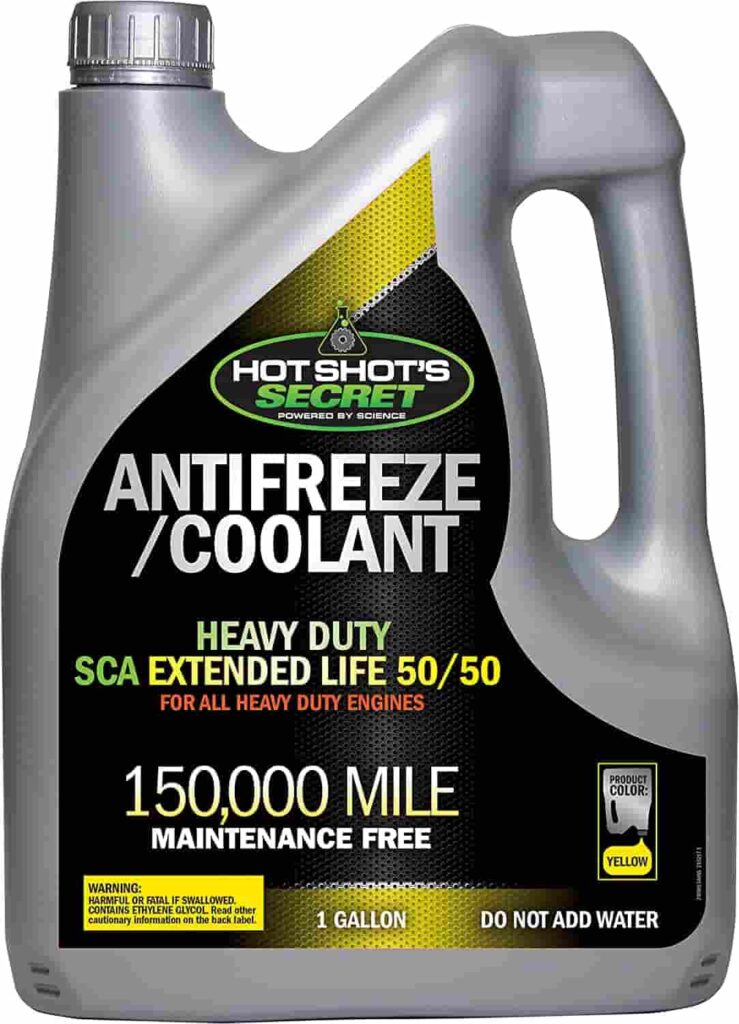
Propylene glycol antifreeze isn’t as harmful as ethylene glycol. While it is not considered toxic or dangerous to grass or other plants, it can cause yellowing. Additionally, the contaminants such as copper, lead, zinc, and 1-4 dioxane found in antifreeze will prevent the grass from thriving.
Note: If you are a pet lover, be cautious. Pets like dogs and cats are attracted to this sweet-smelling taste, but it’s highly lethal to pets once indigested and metabolized. Antifreeze contains ingredients that contain a high level of ethylene glycol that is toxic and kills cats and dogs.
How do you neutralize antifreeze on a lawn?
Antifreeze spills will kill the turfgrass if not cleaned and contained immediately. You’ll need to immediately neutralize the spill to salvage the grass and surrounding area.
- Clean and neutralize the spill immediately. Use absorbent materials like sand, ash, clay, cat litter, or sawdust to handle antifreeze spills. Use baking soda for smaller spills, though baking soda kills grass in large quantities. Pour a generous amount of these substances into the spill and the surrounding area to prevent spreading. Wait for about 30 minutes before clearing the area.
- Lay towels, newspaper, and sponges or any absorbent material to contain it. The absorbent materials prevent the antifreeze from spreading further. Continue adding until all the liquid is absorbed.
- Allow the material to absorb the antifreeze and wait for approximately 1-3 hours for the absorption.
- Pick up the absorbent material and dispose of it with the towels in the trash. Use a heavy-duty plastic bag or trash bag to dispose of everything contaminated.
- Wait for the dried antifreeze to break down before you hose down the remaining material with water. Let the affected spot air dry and check for any stains on the grass.
- If any stains remain, repeat the process as often as necessary to ensure all the antifreeze is decontaminated and neutralized.
Note: Avoid dousing the antifreeze spill area with water. Antifreeze chemicals are harmful to underground water sources, therefore dont hose the spill with water before first neutralizing it.
How long does antifreeze stay in the ground?
Ethylene glycol and propylene glycol are biodegradable and will be broken down into carbon dioxide and water. The breakdown takes several weeks or months in the ground, depending on soil temperature.
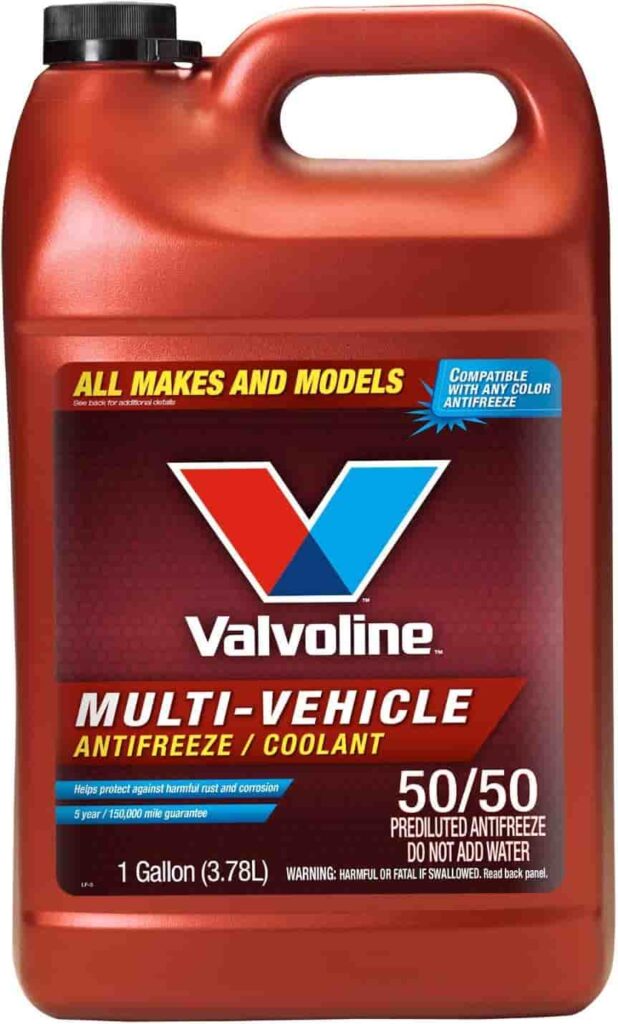
The biodegradation rate is higher in soils with more organic matter and higher temperatures. In the air, it takes 10 days to dissipate entirely.
The acidic byproducts lower soil pH when glycol is broken down in the soil. Ethylene glycol or ethanol-based antifreeze will take longer to break down in the soil than propylene glycol.
Avoid pouring or disposing of antifreeze into the environment because of the dangers imposed on humans, plants, and water bodies.
Tips for handling antifreeze spills on grass
- Wear protective gear like gloves and a nose mask to prevent inhalation and skin contact.
- Keep children and pets away from the area.
- Clean all the equipment used thoroughly.
- Antifreeze is dangerous if ingested by people or animals. Pets have reportedly died from antifreeze poisoning.
- Keep your antifreeze in a labeled container and away from children.
See Also: Does dog urine kill grass?
Other tips to control antifreeze on the lawn
- Since propylene glycol antifreeze is more non-toxic to grass than ethylene glycol, you can consider using it for your vehicles.
- Drain antifreeze immediately from the radiator and heater core to prevent spills.
- Recycle the antifreeze waste. Locate your local recycling center to direct you on how to dispose of used antifreeze. Ensure the disposal or reprocessing complies with government or local disposal regulations.
If you don’t recycle the antifreeze waste, you should treat it as a dangerous substance.
References
- Center for Disease Control(CDC): Toxicological profile for Ethylene Glycol.

![Ariens Zero-Turn Mower Problems [Troubleshooting + Fixes]](https://lawnmodel.com/wp-content/uploads/2022/05/Ariens-Zero-Turn-Mower-Problems-and-fixes-768x576.jpg)
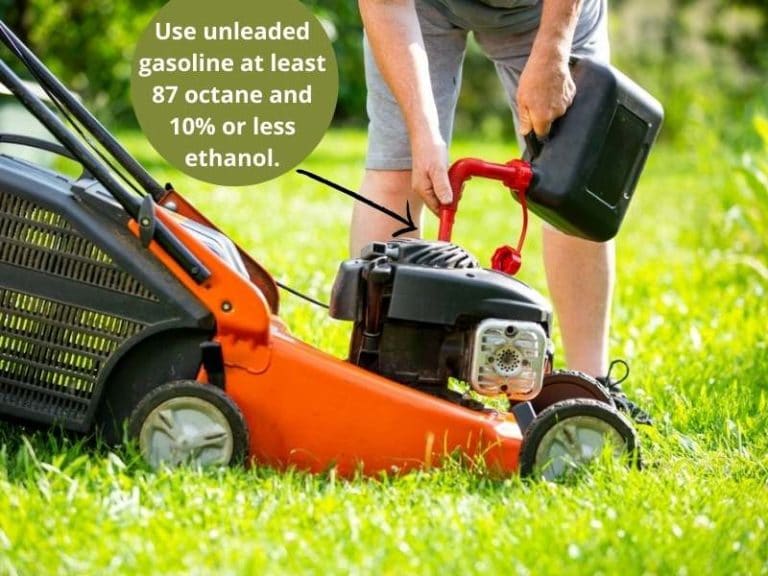
![Ariens Riding Mower Transmission Problems [Troubleshooting + Fixes]](https://lawnmodel.com/wp-content/uploads/2022/05/Ariens-RidingMower-Transmission-Problems-768x576.jpg)
